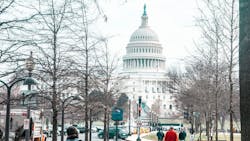President Biden releases budget blueprint for FY22 discretionary spending including $25.6 billion for USDOT
The Biden Administration released its Fiscal Year 2022 Discretionary Budget on April 9, which outlines the administration’s discretionary funding priorities required for lawmakers to start the appropriations process that will lead to an enacted budget.
The proposal, also referred to as the “skinny budget,” includes a $317-million increase for U.S. Department of Transportation (USDOT) discretionary programs, but notes discretionary resources are a fraction of USDOT’s total budget. Most of USDOT’s mandatory funding comes from the Highway Trust Fund and a proposed mandatory budget is forthcoming from the Biden Administration.
“The president is committed to making a once-in-a-lifetime, generational investment to significantly improve America’s transportation infrastructure, promote greater racial equity and economic inclusion, support good-paying union jobs, expand access to healthy transportation options that reduce greenhouse gas emissions and protect infrastructure from the impacts of climate change,” the Office of Management and Budget wrote in its discretionary budget proposal.
What the discretionary budget calls for within the $25.6 billion proposed for USDOT:
- $625 million for a new passenger rail competitive grant program;
- $375 million for Consolidated Rail Infrastructure and Safety Improvement (CRISI) grants that both freight and passenger railroads are eligible;
- $2.7 billion for Amtrak for improvements and expansion of the Northeast Corridor and national passenger rail network;
- $2.5 billion for the Capital Investment Grant program;
- $250 million for transit agencies to purchase low- and zero-emission buses;
- $110 million in new funding for grants and technical assistance to communities as a “down payment on advancing transportation equity” and
- $1 billion for the Better Utilizing Investments to Leverage Development (BUILD) grant program.
The proposal also includes a request to significantly increase the budget for the Office of Civil Rights to further transportation equity, but no dollar amount was provided.
Administration officials point to “overly restrictive budget caps” of the past decade, which have resulted in underinvestment in “core public services, benefits and protections that are incredibly important” to the success of the nation.
Sen. Patrick Leahy (D-VT), who serves as chairman of the Senate Committee on Appropriations, says the proposed investments included in the discretionary budget are “necessary and urgent.”
“The Budget Control Act of 2011, which set decreasing caps on discretionary spending, has had devastating consequences despite bipartisan efforts to lift the budget caps. It is no accident our country was unprepared for the COVID-19 pandemic and that our national stockpile of equipment like PPE and ventilators was woefully inadequate, nor is it surprising that our nation’s infrastructure is crumbling. It was the consequence of insufficient public investments, and this is a story that rings true across the entire country,” said Sen. Leahy.
He says the blueprint makes “strong investments in Americans and communities.”
“I look forward to receiving the administration’s full budget in the coming weeks so that Congress can pass a budget resolution and the Senate Appropriations Committee can begin its work of marking up bills. It has been a trying year for all of us. Congress must come together on a bipartisan basis and do the work of the American people by marking up all 12 appropriations bills,” said Sen. Leahy.
About the Author

Mischa Wanek-Libman
Group Editorial Director
Mischa Wanek-Libman is director of communications with Transdev North America. She has more than 20 years of experience working in the transportation industry covering construction projects, engineering challenges, transit and rail operations and best practices.
Wanek-Libman has held top editorial positions at freight rail and public transportation business-to-business publications including as editor-in-chief and editorial director of Mass Transit from 2018-2024. She has been recognized for editorial excellence through her individual work, as well as for collaborative content.
She is an active member of the American Public Transportation Association's Marketing and Communications Committee and served 14 years as a Board Observer on the National Railroad Construction and Maintenance Association (NRC) Board of Directors.
She is a graduate of Drake University in Des Moines, Iowa, where she earned a Bachelor of Arts degree in Journalism and Mass Communication.
